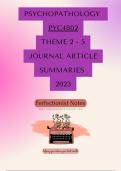PSYCHOPATHOLOGY
PYC4802
THEME 2 - 5
JOURNAL ARTICLE
SUMMARIES
2023
Perfectionist Notes
PRIVATE TUTOR FOR HONOURS IN PSYCHOLOGY - UNISA
helping you achieve your best results
,2023 JOURNAL ARTICLES
THEME 2
, Property of Perfectionist Notes
Plagiarism/distribution/selling/illegal use of these notes will be prosecuted
Prescribed readings with links to download:
THEME 2
Journal articles
1. Averill, P.M. (2000). Posttraumatic stress disorder in older adults: A Conceptual Review.
Journal of Anxiety Disorders, 14(2), 133-156. https://sci-hub.se/10.1016/s0887-
6185%2899%2900045-6
2. Brown, P.J., & Wolfe, J. (1994). Substance abuse and post-traumatic stress disorder
comorbidity. Drug and Alcohol Dependence, 35, 51-59. https://sci-hub.se/10.1016/0376-
8716%2894%2990110-4
3. De Silva, P. (1993). Post-traumatic stress disorder: Cross-cultural aspects. International
Review of Psychiatry, 5, 217-229. https://sci-hub.se/10.3109/09540269309028312
4. Giel, R. (1990). Psychosocial processes in disasters. International Journal of Mental Health,
19(1), 7-20. https://sci-hub.se/10.1080/00207411.1990.11449150
5. Joseph, S. (1997). Understanding post-traumatic stress (pp. 51-67). West Sussex: Wiley &
Sons.https://drive.google.com/file/d/1Yqnd4eSdmKWsOHZdNQIaxMJZHwM0WSiw/view?
usp=drive_link
6. Keane, M.T., Taylor, K.L., & Penk, W.E. (1997). Differentiating post-traumatic stress disorder
(PTSD) from major depression (MDD) and generalized anxiety disorder (GAD). Journal of
Anxiety Disorders, 11(3), 317-328. https://sci-hub.se/10.1016/s0887-
6185%2897%2900013-3
7. McFarlane, A.C., Atchison, M., Rafalowicz, E., & Papay, P. (1994). Physical symptoms in post-
traumatic stress disorder. Journal of Psychosomatic Research, 38(7), 715-726. https://sci-
hub.se/10.1016/0022-3999%2894%2990024-8
8. Nutt, D., Davidson, J.R.T., & Zohar, J., (Eds.) (2000). Post-traumatic stress disorder diagnosis,
management and treatment (pp. 147-161). Malden, MA: Blackwell Science.
https://drive.google.com/file/d/13EPKNPCG_l0HhpXt85LBTpON7PE67Xsq/view?usp=driv
e_link
9. Rosen, G.M., (Ed.) (2004). Posttraumatic Stress Disorder: Issues and controversies (pp.147-
161). West Sussex, England: John Wiley & Sons. http://www.al-edu.com/wp-
content/uploads/2014/05/Rosen-ed-Posttraumatic-Stress-Disorder-Issues-and-
Controversies.pdf
10. Schumm, J. A., Stines, L. R., Hobfoll, S. E., & Jackson, A. P. (2005). The double‐barreled burden
of child abuse and current stressful circumstances on adult women: The kindling effect of
early traumatic experience. Journal of Traumatic Stress, 18(5), 467-476. https://sci-
hub.se/10.1002/jts.20054
11. All DSM-5 Diagnostic Criteria will come from this textbook > the official DSM-5 APA
textbook: http://repository.poltekkes-
kaltim.ac.id/657/1/Diagnostic%20and%20statistical%20manual%20of%20mental%20dis
orders%20_%20DSM-5%20%28%20PDFDrive.com%20%29.pdf
, Property of Perfectionist Notes
Plagiarism/distribution/selling/illegal use of this document will be prosecuted
THEME 2
ARTICLE 1
Posttraumatic stress disorder in older adults
1. Averill, P.M. (2000). Posttraumatic stress disorder in older adults: A Conceptual Review. Journal of
Anxiety Disorders, 14(2), 133-156. https://sci-hub.se/10.1016/s0887-6185%2899%2900045-6
KEYWORDS/POINTS OF THE ARTICLE
Delayed Onset information
PTSD in older adults
Posttraumatic stress disorder in older adults: A Conceptual Review
This review indicates that PTSD does occur in older adults with similar symptoms as noted in younger
adults
Interestingly, some salient differences in PTSD have been documented in older adults, such as differences in
the natural course of the disorder, suggesting that the expression of PTSD may be influenced by factors
such as natural changes brought about by aging, the societal zeitgeist at the time of trauma, and the
presence (or absence) of diagnostic comorbidity
DEFINITION: Posttraumatic stress disorder is initiated by exposure to extraordinarily stressful life events,
such as military combat, violent personal assault, being taken hostage, natural or manmade disasters, and
severe car accidents.
WHAT ARE THE UNIQUE SYMPTOMS OF POSTTRAUMATIC STRESS DISORDER IN OLDER ADULTS ?
most older adults who were traumatized earlier in their life report an episodic course, with symptom
exacerbations and remissions over time
Suggesting that time of study is likely to impact the presentation of symptoms.
Additionally, symptoms such as sleep disturbance and memory impairment are seen more commonly in
older adults in general and may not be associated with trauma exposure per se
Studies examining PTSD symptoms in individuals traumatized later in life show that older adults may
experience somewhat different symptoms than those reported by younger adults after trauma exposure.
CAN POSTTRAUMATIC STRESS DISORDER BEGIN MANY YEARS AFTER TRAUMA EXPOSURE IN OLDER
ADULTS?
1




